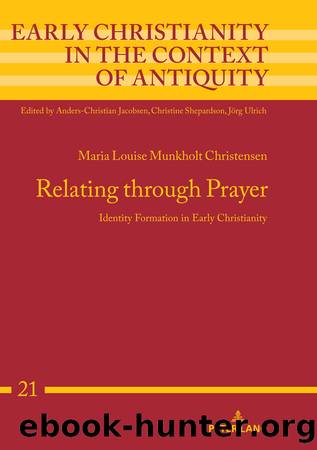Relating Through Prayer by Maria Louise Munkholt Christensen;

Author:Maria Louise Munkholt Christensen;
Language: eng
Format: epub
Publisher: Peter Lang Copyright AG
3.2.5.5 Silent prayer and contemplation
It should also be mentioned that prayers were not necessarily supposed to be verbal at all; Origen holds Hannahâs and Jonahâs silent prayers as ideal.806 Even more or less wordless prayers were approved.807 It even seems that silent or mental prayer is ideal according to Origen, although he in no way dismisses verbal prayer.808
â185 | 186â The two Alexandrian authors promote contemplation, θεÏÏία, as the finest form of Christian contact with God. It is an activity for the rational mind, it is thinking about and reflecting on God, and it is perfect prayer. Contemplation is, however, not only presented as an intellectual exercise of reflection, but also as a way to be lead to unification with God. However, it is not an easy endeavour, since it requires knowledge of God, but also a mind worthy of God. For Clement, contemplation is the true and gnostic way to pray, and the true gnostic remains in âuninterrupted contemplation.â809 Clement understands âcontemplationâ to be a perfection of prayer and life, a way of moving as close to God as possible and thus as proleptic salvation.810 Soul and mind can communicate with God without use of voice and tongue, and the human thought can pray in a most perfect way.811 Similarly, Origen understands contemplation as an ideal activity. According to Origen, intellectual beings were made to contemplate Godâs goodness, but fell away from this activity and now have to find their way back.812 Origen writes that the greatest benefit of prayer is gained by those who âlook beyond what is begotten and contemplate (á¼Î½Î½Î¿Îµá¿Î½) God alone, and hold modest and solemn converse with the one who hears them.â813 They will be transformed into Godâs image (Ïὴν αá½Ïὴν εἰκÏνα μεÏαμοÏÏÎ¿Ï Î¼ÎÎ½Î¿Ï Ï). Elsewhere in Perì Euchês, Origen is more explicit in that he contrasts those, who are ignorant of God and consequently do not know for what to pray, with those who are contemplating God, and therefore know what is truly good:
âAnyone who is ignorant of God is ignorant of the things of God, and ignorant of the things that are necessary; what he reckons as necessary are the wrong things. But whoever has contemplated (á½ ÏεθεÏÏηκὼÏ) the better and more divine things, which are necessary to him, will obtain the objects of his contemplation (ὧν ÏεθεÏÏηκε), for they are known of God, and are known to the Father even before they are requested.â814
â186 | 187â In his Commentary on the Song of Songs, Origen is stating a similar point when he writes that theoria is going âbeyond things seen and contemplate to a degree things heavenly and divine, beholding them with the mind alone.â815 Contemplation is a mode of piety and is a goal to which âordinary Christiansâ can and should strive, since the ability to contemplate God requires a certain practice, mastery of passions, love, faith and knowledge. It is a mode of piety that goes beyond simply praying for earthly goods. As such contemplation is a form of mysticism, because
Download
This site does not store any files on its server. We only index and link to content provided by other sites. Please contact the content providers to delete copyright contents if any and email us, we'll remove relevant links or contents immediately.
FOX'S BOOK OF MARTYRS by Adrian Ebens(313)
(eng) Mervyn Peake - Gormenghast 2.5 by Boy in Darkness(218)
The Second Coming of Saturn: The Great Conjunction, Americaâs Temple, and the Return of the Watchers by Derek P. Gilbert(206)
The origins of violence by John Docker(194)
Llewellyn's 2024 Sabbats Almanac by Llewellyn Publishing(181)
English Cathedral & Monastic Carpentry by Cecil A. Hewett(171)
The Second Coming of Gluttony: 1-489 by FudgeNouget(169)
THE ORIGIN OF ALL RELIGIOUS WORSHIP by DUPUIS(169)
Journey through the Text of "A Course in Miracles by Kenneth Wapnick Ph.D(167)
The Lesser Key of Solomon by Samuel Liddell MacGregor Mathers(166)
668113337 by Unknown(161)
The Healing Power of Kindness âVolume 1: Releasing Judgment by Kenneth Wapnick(159)
Tao of Wing Chun Do by (Volume 2 Chi Sao)(158)
Vasubandhu's "Three Natures by Ben Connelly(156)
The Knights Templar and their myth by Peter Partner Murdered magicians(154)
Being, While Knowing That You Are Not: Surrendering to the sadness and madness of life (Reality Explained Trilogy Book 2) by Marc Leavitt(152)
Lillian Too's Irresistible Feng Shui Magic by Lillian Too(142)
Llewellyn's 2023 Sabbats Almanac by Elizabeth Barrette(140)
The Church of the Covenant 1637-1651 by Walter Makey(133)
